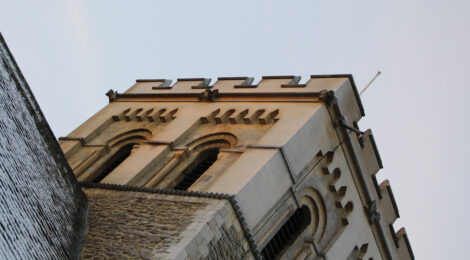
SERMON: In astonishment we respond in wonder and praise
A sermon preached at St Mary’s Iffley by Andrew McKearney on 12th February 2023
We’ve just recited the Apostles’ Creed which opens with the words:
‘I believe in God the Father Almighty,
maker of heaven and earth.’
What those opening words of the Apostles’ Creed have done is take the poetry of the creation story from the book of Genesis that we heard read tonight, and turn it into prose.
The wonder of creation fires the human imagination and inspires the scientific quest. I can remember as a boy sleeping out under the stars on a family holiday in Greece, and as an adult sleeping out under the stars in the Sinai desert, and on both occasions finding the night sky quite overwhelming and awe-inspiring.
A New Testament scholar, James Mackey, in his book on Jesus has a fascinating discussion about miracles. There he writes:
‘…it is difficult to see that any event which happens in
this universe could be more indicative of the presence of
divinity than the universe itself. If we cannot have
religious faith, then, from our native experience of nature
and humanity, it would be difficult to see that miracles
could provide us with it.’
It’s a point well made.
The scientific quest is rightly concerned with answering the question ‘how’ – how has the universe come into being, how are things the way they are now? The religious quest is different. It’s concerned with answering the question ‘why’. Why is there anything at all?
And the reason Christians give that anything exists at all, the answer to the ‘Why’ question, is that it’s due to the overflowing abundance of God’s love.
Our experience of human love is the closest we can get to the idea of something happening, someone or something coming into existence, not out of necessity, not out of compulsion, but completely and utterly offered, created, made from the dynamic of love, a love which goes out from itself for no other reason except that it is love.
Julian of Norwich gave memorable expression to this insight as to why anything exists at all. Describing one of her visions, she famously wrote:
‘God showed me more, a little thing, the size of a
hazel-nut, on the palm of my hand, round like a ball.
I looked at it thoughtfully and wondered, ‘What is this?’
And the answer came, ‘It is all that is made’. I marvelled
that it continued to exist and did not suddenly
disintegrate; it was so small. And again my mind supplied
the answer, ‘It exists, both now and for ever, because God
loves it’. In short’ Julian concludes, ‘everything owes its
existence to the love of God.’
This, as I’ve sometimes referred to before, is called the ‘positive way’ or in Latin the ‘via positiva’ or in Greek the ‘kataphatic way’. In the Bible and in our hymns, image, metaphor, poetry are all used to express our understanding and experience of God as creator.
But there’s also another way.
If that is the right hand of Christian theology there’s also the left hand, the ‘negative way’ or in Latin the ‘via negativa’ or in Greek the ‘apophatic’ way. This way stresses the otherness of God, that God is not an object like other objects, a person like other persons.
So unlike human beings who make things and create people, as Christians we affirm that God does so out of nothing, ‘ex nihilo’ to use the Latin phrase. This acts as something of a check against too human a view of God as creator.
Both approaches, the positive and the negative ways, need to be kept in mind in our talk about God our creator. Which is exactly what the story from the book of Genesis does.
The book of Genesis is surprisingly restrained in its account of creation. It says nothing at all as to why God created in the first place. And in describing how creation came into being, no dragons are cut in half to make the world, there’s no primordial fight with some great beast, nor any consort for God to mate with, as in many of the other creation stories in the ancient world.
Instead, God simply speaks.
‘Then God said, ‘Let there be light…..’
And God said, ‘Let there be a dome in the midst of the
waters…..’
Then God said, ‘Let the earth put forth vegetation…..’
And God said, ‘Let there be lights in the dome of the
sky…..’
Then God said…..
And God said…..
God speaks and creation comes into being.
In astonishment we respond in wonder and praise.





